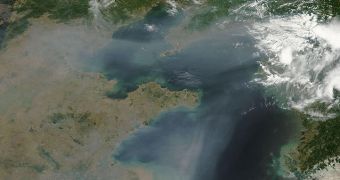Climate scientists say that one of the reasons why Asia is cooler than other regions of the world is the fact that it generates a lot of pollution. Counter-intuitively, in addition to destroying the environment below, the thick layers of haze that cover most of the continent, especially above China and India, also reflect back a large amount of the sunlight that would otherwise get trapped in the atmosphere. Knowing this, investigators now find themselves in the awkward position of researching where they could employ pollution from power plants in offsetting the carbon dioxide the same facilities emit.
Naturally, such a method would only function temporarily, if at all. In addition, it involves emitting significant amounts of pollution, so as to turn the skies gray and fill the air with sulfur-based chemicals. Scientists have already developed a computer model aimed precisely at gaging the amount of carbon offset that will occur over Asia in the coming years, when China and India, as some of the fastest developing nations on Earth, will account for 80 percent of new emissions from coal power plants.
The model led scientists to believe that operating new, fossil fuel-based power plants without any restrictions on the amount of sulfur dioxide (SO2) and nitrogen oxides (NO) they emit could actually be beneficial for the environment. Climatologists explain that the amount of sunlight these chemicals send back into space could be enough to offset the local warming effect caused by the carbon dioxide these plants emit as well. In fact, the simulation shows, it may even be possible to use pollution to trigger local cooling, but the researchers highlight that this would be impossible to scale up globally without destroying the atmosphere.
“The paper highlights the fundamental inequity and iniquity of anthropogenic climate change: 'enjoy now and make others pay later',” explains aerosol expert Meinrat Andreae, who is based at the Max Planck Institute for Chemistry, in Mainz, Germany. He was not a part of the new study. The expert adds that coal-powered electrical plants could actually be construed into “a very primitive form of geoengineering.” The study is currently being reviewed, and will most likely be published in an upcoming issue of the scientific journal Atmospheric Chemistry and Physics, Nature News reports.

 14 DAY TRIAL //
14 DAY TRIAL //